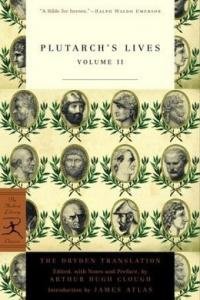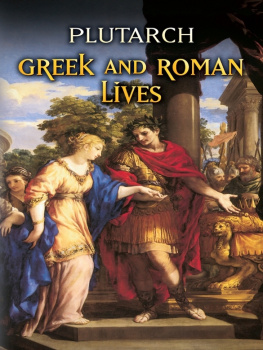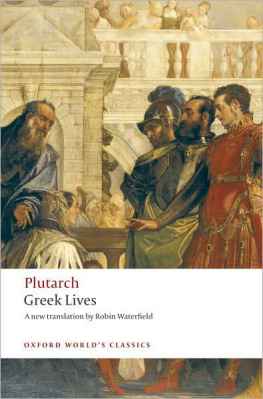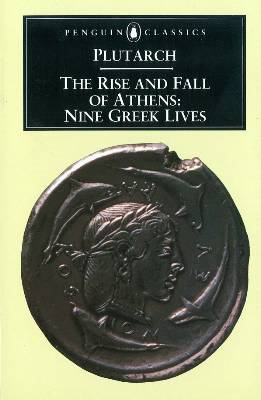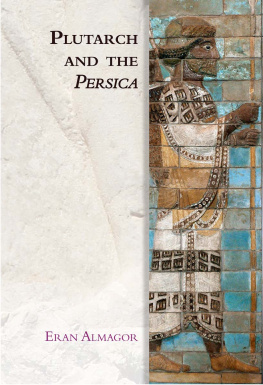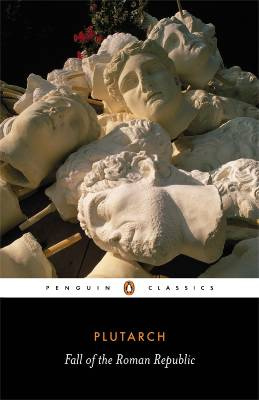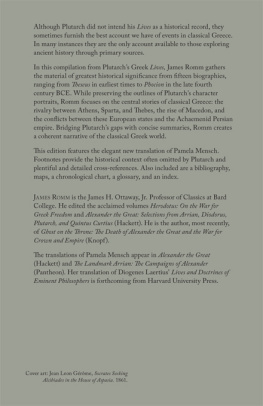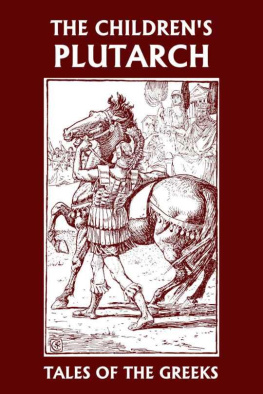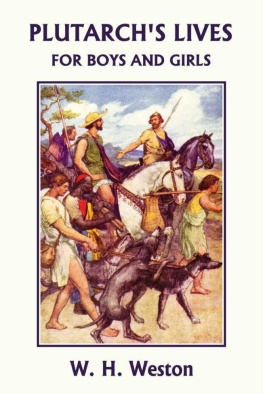Plutarch's Lives: Volume II
Plutarch
I. Cato the elder, speaking to some persons who were praising a man of reckless daring and audacity in war, observed that there is a difference between a man's setting a high value on courage, and setting a low value on his own lifeand rightly. For a daring soldier in the army of Antigonus, but of broken and ill health, being asked by the king the reason of his paleness, confessed that he was suffering from some secret disorder. When then the king, anxious for him, charged his physicians to use the greatest care in their treatment, if a cure were possible, at length this brave fellow, being restored to health, was no longer fond of peril and furious in battle, so that Antigonus reproved him, and expressed surprise at the change. The man made no secret of his reason, but answered: "My, king, you have made me less warlike by freeing me from those miseries on account of which I used to hold my life cheap." And the Sybarite seems to have spoken to the same effect about the Spartans, when he said that "they do no great thing by dying in the wars in order to escape from such labours and such a mode of life as theirs." However, no wonder if the Sybarites, effete with luxurious debauchery, thought men mad who despised death for love of honour and noble emulation; whereas the Lacedmonians were enabled by their valour both to live and to die with pleasure, as the elegy shows, which runs thus:
"'Twas not that life or death itself was good,
That these heroic spirits shed their blood:
This was their aim, and this their latest cry,
'Let us preserve our honour, live or die.'"
For neither is avoidance of death blameable, if a man does not cling to his life from dishonourable motives; nor is exposure to peril honourable, if it springs from carelessness of life. For this reason Homer always brings the most daring and warlike heroes into battle well and beautifully armed, and the Greek lawgivers punish the man who throws away his shield, but not him who throws away his sword or spear, showing that it is each man's duty to take more care that he does not receive hurt himself, than to hurt the enemy, especially if he be the chief of an army or city.
II. For if, as Iphikrates defined it, the light troops resemble the hands, the cavalry the feet, the main body the breast and trunk, and the general the head, then it would appear that he, if he runs into danger and shows personal daring, risks not only his own life, but that of all those whose safety depends upon him; and vice vers. Wherefore Kallikratidas, although otherwise a great man, yet did not make a good answer to the soothsayer; for when he begged him to beware of death, which was presaged by the sacrifices, he replied that Sparta had more men besides himself. No doubt, in fighting either by sea or land Kallikratidas only counted for one, but as a general, he combined in his own person the strength of all the rest, so that he by whose death so many perished, was indeed more than one. A better answer was that of old Antigonus, who, as he was about to begin a seafight off Andros, some one having said that the enemy's fleet was the more numerous, asked, "And for how many do you count me?"setting a high value, as is due, upon a skilful and brave leader, whose first duty is to keep safe him who preserves all the rest.
So Timotheus said well, when Chares was displaying to the Athenians the wounds on his body, and his shield pierced by a dart. "Now I," said he, "when I was besieging Samos, was quite ashamed if an arrow fell near me, thinking that I was exposing myself more boyishly than was fitting for the general and leader of so important a force." In cases where the personal risk of the general is of great moment to his army, then he must fight and expose himself without stint, and disregard those who say that a general should die of old age, or at any rate, when an old man. But where the gain is small in case of success, while failure ruins everything, no one demands that the work of the common soldier be performed at the risk of the general's life.
These prefatory remarks occurred to me in writing the Lives of Pelopidas and Marcellus, great men who fell in a manner scarce worthy of themselves: for being both of them most stout in battle, and having each illustrated his country by splendid campaigns, against, too, the most terrible antagoniststhe one, as we read, having routed Hannibal, who before was invincible, and the other having in a pitched battle conquered the Lacedmonians, the ruling state by sea and landyet they without any consideration endangered themselves and flung away their lives just at the time when there was special need for such men to live and command. And on this account I have drawn a parallel between their lives, tracing out the points of resemblance between them.
III. The family of Pelopidas, the son of Hippokles, was an honourable one at Thebes, as likewise was that of Epameinondas. Bred in great affluence, and having early succeeded to a splendid inheritance, he showed eagerness to relieve the deserving poor, that he might prove that he had become the master, not the servant of his riches. In most cases, Aristotle observes, men either do not use their wealth through narrowmindedness, or else abuse it through extravagance, and the one class are always the slaves of their pleasures, the other of their gains.
Now, while all other persons gratefully made use of Pelopidas's liberality and kindness, Epameinondas alone could not be induced to share his wealth; he thereupon shared the other's poverty, priding himself on simplicity of dress and plainness of food, endurance of fatigue, and thoroughness in the performance of military service; like Kapaneus, in Euripides, who "had plenty of wealth, but was far from proud on account of his wealth," for he felt ashamed to be seen using more bodily luxuries than the poorest Theban citizen. Epameinondas, whose poverty was hereditary, made it lighter and more easily borne by the practice of philosophy, and by choosing from the beginning a single life; while Pelopidas made a brilliant marriage and had children born to him, yet, in spite of this, diminished his fortune by disregard of moneymaking and by giving up all his time to the service of his country. And when his friends blamed him, and said that he was treating lightly a necessary of life, the possession of money, "Necessary, indeed," he answered, "for Nikodemus here," pointing to a man who was a cripple and blind.
IV. They were both alike in nobleness of spirit, save that Pelopidas took more pleasure in bodily exercise, and Epameinondas in learning, and that the one in his leisure time frequented the palstra and the hunting field, while the other would listen to and discuss philosophy. And though they have both many titles to glory, yet judicious persons think nothing so much to their credit as that their friendship should have remained from beginning to end unimpaired through so many important crises, campaigns, and administrations. For any one who considers the administrations of Aristeides and Themistokles, and Kimon and Perikles, and Nikias and Alkibiades, how full they were of mutual enmity, distrust, and jealousy, and then contrasts them with the kindness and respect shown by Pelopidas to Epameinondas, will pronounce with truth these men to have really been colleagues in government and war rather than those who were constantly struggling to get the better of one another instead of the enemy. The true cause of this was their virtue, guided by which they sought no glory or gain for themselves from their deeds, from which envious rivalry always results, but both, inflamed by a noble desire to see their country reach its climax of power and renown in their own time, used one another's successes for this purpose as if they were their own. Not but what most people think that their closest friendship arose from the campaign of Mantinea, which they made with a contingent sent from Thebes to serve with the Lacedmonians, who were then their friends and allies. Stationed together in the ranks, hurt, ran forward and stood in defence of his body and arms, risking his life alone against a multitude, determined to die rather than leave Pelopidas lying there. He too was in evil plight, with a spear wound in the breast, and a swordcut on the arm, when Agesipolis, the Spartan king, came to the rescue from the other wing, and most unexpectedly saved the lives of both.

